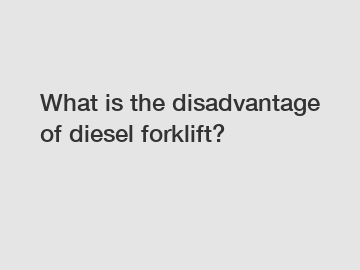What is the disadvantage of diesel forklift?
The disadvantage of diesel forklift lies in its environmental impact. Diesel forklifts emit large amounts of harmful pollutants, such as particulate matter, nitrogen oxides, and sulfur oxides. These emissions contribute to air pollution and have detrimental effects on both human health and the environment.
The source of this disadvantage can be attributed to the combustion of diesel fuel in the engine. The combustion process releases various pollutants into the atmosphere. Particulate matter, also known as soot, consists of tiny particles suspended in the air. These particles can penetrate deep into the lungs when inhaled, causing respiratory problems and cardiovascular diseases.
Nitrogen oxides, formed during the combustion process, are a major contributor to air pollution. They react with sunlight to form ground-level ozone, which is a primary component of smog. High levels of ozone can cause respiratory issues, eye irritation, and even lung damage. Additionally, nitrogen oxides contribute to the formation of acid rain, which harms plant and animal life and damages buildings and infrastructure.

Sulfur oxides, another byproduct of diesel combustion, are known for their negative impact on the environment. They contribute to the formation of acid rain and can lead to the degradation of ecosystems. Inhaling sulfur oxides can also cause respiratory problems and exacerbate existing conditions such as asthma.
The environmental disadvantages of diesel forklifts have significant implications. The increase in air pollution from diesel emissions not only affects the immediate surroundings but also contributes to global pollution and climate change. The release of greenhouse gases, including carbon dioxide, exacerbates the greenhouse effect and leads to the warming of the planet.
To mitigate these environmental concerns, alternatives to diesel forklifts have emerged. Electric forklifts, for example, produce zero emissions and are much cleaner in terms of air pollution. They are powered by rechargeable batteries and can operate silently, making them suitable for indoor use. Despite their initial higher cost, the long-term benefits and environmental advantages make electric forklifts a viable option.
In conclusion, the major disadvantage of diesel forklifts lies in their negative impact on the environment. The emissions arising from the combustion process contribute to air pollution, which has detrimental effects on human health and ecosystems. Recognizing these disadvantages has led to the development and adoption of cleaner alternatives, such as electric forklifts. By transitioning to more sustainable options, we can reduce our dependence on diesel and minimize its negative consequences on the environment.
Are you interested in learning more about 10 ton diesel forklift, 10 ton container forklift, electric empty container handler? Contact us today to secure an expert consultation!


